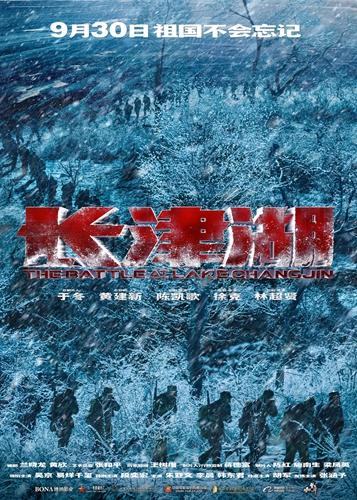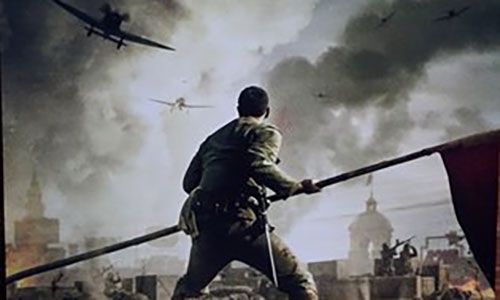ARTS / FILM
China’s blockbuster depicts spirits of warriors during the War to Resist US Aggression and Aid Korea
Sacrifices remembered

Promotion material for The Battle at Lake Changjin Photo: Courtesy of Maoyan
After being delayed in August due to new imported cases of COVID-19, one of the most anticipated movies of 2021, The Battle at Lake Changjin, finally made its way to theaters on Saturday in pre-screenings across China ahead of its official debut on Thursday.Lucky to be one among the first of thousands to see the film, I have to say it was worth the two-month wait to see such a great film, probably the best Chinese war film in recent years.
All in all, it deserves the title of China's biggest budget film through the efforts of three Chinese heavyweight directors Chen Kaige (Farewell My Concubine), Dante Lam (Operation Red Sea) and Tsui Hark (The Taking of Tiger Mountain) as well as A-list actors such as tough guy Wu Jing (Wolf Warrior) and the young promising Jackson Yee (Better Days).
The nearly three-hour historical epic, expected to rank amongst China's highest grossing films of the year, not only explains why China had to fight a war against the US, which had the most powerful military strength at the time, but also how young Chinese soldiers sacrificed their lives to win "respect and pride" and defend our motherland.
Pride on the battlefield
Thousands of young soldiers lost their lives during the Battle of Changjin Lake, also known as the Battle of Chosin Reservoir, to secure a crucial win against the US during the War to Resist US Aggression and Aid Korea (1950-53), more commonly known as the Korean War in the West.
Different from documentaries and TV series that only depicted the blood and hardship of the battle, the new movie makes it clear to audiences how top Chinese leaders like Chairman Mao made the decision to enter Korea and even send his own son to war, who eventually lost his life in an air strike by the US Air Force.
While Mao explained China's involvement in the way as "strike one punch to avoid a hundred punches," a simpler explanation comes from an ordinary solider in the movie, "we fight wars for our children and grandchildren, who won't need to take part in warfare anymore."
Facing down the US military with its tanks, artillery and powerful air force, our soldiers had to fight against heavily equipped US Marines while armed only with light weapons and without the clothing needed to keep from freezing to death, knowing that "pride can only be earned on the battlefield."
One scene in the movie that touched me the most was the sharp comparison in conditions, where the US soldiers are seen enjoying a Christmas feast of cooked turkey in the warm tents while Chinese warriors hid among the cold mountain-tops at night with only one small frozen potato each. One small bite even cost one soldier a tooth.
China's 'Band of Brothers'
Without the movie, those of us living in a world full of high technology from fast internet to mobile phones would have a difficult time imagining the sacrifices they made for us. Everyone needs to remember their spirit, from the sacrifices they made to the bonds of brotherhood among soldiers they formed.
Each member of the Seventh Company that the movie focuses on are remembered by their brothers, even after some of them are killed or discharged after being severally wounded. The company captain, played by Wu, had lost his elder brother during the Civil War (1946-49) period, but nevertheless had to accept his young brother as a new solider who follows him in the hope of becoming a hero like his brother on the battlefield.
I could feel the spirit of these young warriors, "I don't want to fight, but still, I must fight for my country, my parents, my brothers and my children."
Back to the movie itself, the battle scenes full of explosions, fighting and bombings represent the highest achievements of the China's film industry as well as the focus on details that stay true to history.
The wide use of bugles and whistles among the charging of Chinese soldiers echoed in the memories of many US Marines.
"We heard bugles and whistles, and the Chinese came pouring over the mountain in front of us - thousands firing and shooting, coming down the valley towards us," recalled one US Marine who fought at the battle in a report from CBS News.
"Nothing stopped them."



